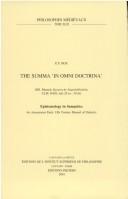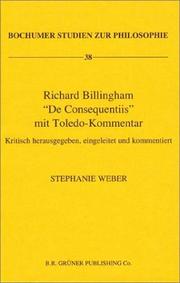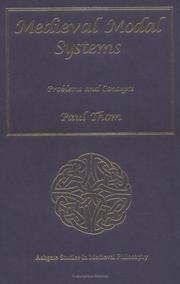| Listing 1 - 10 of 72 | << page >> |
Sort by
|
Book
ISBN: 8876420274 Year: 1991 Publisher: Pisa Scuola normale superiore
Abstract | Keywords | Export | Availability | Bookmark
 Loading...
Loading...Choose an application
- Reference Manager
- EndNote
- RefWorks (Direct export to RefWorks)
Book
Abstract | Keywords | Export | Availability | Bookmark
 Loading...
Loading...Choose an application
- Reference Manager
- EndNote
- RefWorks (Direct export to RefWorks)
Periodical
Year: 1997 Publisher: Leiden ; New York ; Köln Brill
Abstract | Keywords | Export | Availability | Bookmark
 Loading...
Loading...Choose an application
- Reference Manager
- EndNote
- RefWorks (Direct export to RefWorks)
Book
ISBN: 9782503567358 2503567355 Year: 2016 Volume: 82 Publisher: Barcelone: Fédération internationale des instituts d'études médiévales,
Abstract | Keywords | Export | Availability | Bookmark
 Loading...
Loading...Choose an application
- Reference Manager
- EndNote
- RefWorks (Direct export to RefWorks)
This book considers the issue of the formal character of medieval logic and aims at clarifying in what sense the language it is operating on (and in) is natural or not. The late medieval period is widely acknowledged as one of the most salient moments of the history of logic and semantics. It not only considered logic as a sine qua non condition for scientifi c knowledge, it also begot highly sophisticated theories about both argumentation and language. The last fi fty years of increasingly intense research have brought about an ever more detailed knowledge of these theories. And yet, the questions as to what kind of logic is medieval logic, whether and to what extent it corresponds to our conception of logic, and, even, what the nature of its object was, remain challenging. That it has a formal character is widely accepted; and its semantic components display remarkable affi nities with contemporary ones. But is it formal in the way modern logic is – or believes it is ? Medieval logic does not really make recourse to symbolisms, after all, and the fact that the idea of formal validity might have been born in the twelfth century does not mean that developing formal approaches was an aim of medieval logicians. And what is its semantics a semantics of ? Medieval logicians use Latin to deal with Latin constructions, but do these constructions belong to natural language or are they regimented to the point of forming some sort of ideal language ? The twenty-five papers gathered in this volume deal with these issues, thus allowing to reassess the broader questions of the formal character and formalising ambitions of medieval logic, as well as that of the natural character of the language in (and on) which it operated : in other words, they address the question of the nature, object and purpose of medieval logic.
Book
ISBN: 9789042932401 9042932406 9782758402435 2758402432 Year: 2017 Volume: 63 Publisher: Louvain-la-Neuve Leuven Paris Bristol, CT Institut supérieur de philosophie Peeters
Abstract | Keywords | Export | Availability | Bookmark
 Loading...
Loading...Choose an application
- Reference Manager
- EndNote
- RefWorks (Direct export to RefWorks)
It has been a long time ago since Professor De Rijk first drew our attention to an important Parisian manuscript containing two treatises on logic, both connected with the School of the 'Montani'. The school was established in the twelfth century on the Mont Sainte Genevieve (which is situated in what is nowadays known as the Quartier Latin). It was dominated by master Alberic (Albericus) of Paris. The 'Montani' were the heirs (faithful or not) of Pierre Abelard, Robert of Melun and this master Alberic. The present work aims to provide a first working edition of one of the treatises in the manuscript, the 'Introductiones Montane Maiores'. This introductory work on logic contains a wealth of information about the way in which logic was taught and practiced in the schools of Paris of the twelfth century. It also gives insight into the vicissitudes of the teachings of different Parisian masters. The edition is preceded by an extensive introduction, with information about the origins and contents of the text and discussions of some interesting doctrinal elements.
Logic, Medieval --- Logic --- Logic [Medieval ] --- Early works to 1800

ISBN: 9042910461 2877235939 Year: 2001 Volume: 43 Publisher: Leuven Paris Sterling, Virginia Louvain-la-Neuve Peeters Institut supérieur de philosophie
Abstract | Keywords | Export | Availability | Bookmark
 Loading...
Loading...Choose an application
- Reference Manager
- EndNote
- RefWorks (Direct export to RefWorks)
Logic, Medieval --- Logique médiévale --- #A0202W --- Logic, Medieval. --- Logique médiévale --- Medieval logic

ISBN: 1283128047 9786613128041 9027284199 9789027284198 906032367X 9789060323670 Year: 2003 Publisher: Amsterdam ; Philadelphia : B.R. Grüner,
Abstract | Keywords | Export | Availability | Bookmark
 Loading...
Loading...Choose an application
- Reference Manager
- EndNote
- RefWorks (Direct export to RefWorks)
Consequentia (Logic) --- Logic, Medieval --- Billingham, Richard, --- Billingham, Richard
Book
ISBN: 9782503548364 2503548369 Year: 2013 Volume: 10-6 Publisher: Turnhout Brepols
Abstract | Keywords | Export | Availability | Bookmark
 Loading...
Loading...Choose an application
- Reference Manager
- EndNote
- RefWorks (Direct export to RefWorks)
" 'De locis dialecticis' is the sixth treatise of John Buridan's 'Summulae dialecticae', a textbook he wrote for his logic course in the Faculty of Arts at the University of Paris. 'De locis dialecticis' builds upon Peter of Spain, but Buridan shows his awareness that the doctrine of the 'loci' took its origin in Boethius' 'De differentiis topicis', and he frequently quotes from that work. Though not introducing any basically new ideas Buridan contributes a large number of precisions to the standard descriptions of the several 'loci', and he shows that the list of the 'loci' and the traditional division of it into three sections is not something given by nature, but was established by earlier logicians, as they found convenient. Accordingly such things can be changed if something better is found. Buridan has given us perhaps the most precise and interesting exposition of the doctrine of the 'loci' in the medieval logical literature." -- Back cover.
Logic [Medieval ] --- Logica [Middeleeuwse ] --- Logique médiévale --- Medieval logic --- Middeleeuwse logica --- Logic, Medieval. --- Buridan, Jean --- Logic --- Early works to 1800

ISBN: 0754608336 9780754608332 9781315249261 9781351918510 Year: 2003 Volume: *1 Publisher: Aldershot, Hants, England ; Burlington, VT : Ashgate,
Abstract | Keywords | Export | Availability | Bookmark
 Loading...
Loading...Choose an application
- Reference Manager
- EndNote
- RefWorks (Direct export to RefWorks)
Logic [Medieval ] --- Logica [Middeleeuwse ] --- Logique médiévale --- Medieval logic --- Middeleeuwse logica --- Modality (Logic) --- Logic, Medieval. --- History --- To 1500 --- Logic, Medieval --- Modal logic --- Logic --- Nonclassical mathematical logic --- Bisimulation --- Modality (Logic) - History - To 1500.
Book
ISBN: 8822253779 9788822253774 Year: 2004 Volume: 97 Publisher: Firenze Leo S. Olschki
Abstract | Keywords | Export | Availability | Bookmark
 Loading...
Loading...Choose an application
- Reference Manager
- EndNote
- RefWorks (Direct export to RefWorks)
Logic, Medieval --- Linguistics --- Logique médiévale --- Linguistique --- Congresses --- History --- Congrès --- Histoire --- Logique médiévale --- Congrès --- Semantics (Philosophy) --- Logic [Medieval ] --- Medieval logic
| Listing 1 - 10 of 72 | << page >> |
Sort by
|

 Search
Search Feedback
Feedback About
About Help
Help News
News